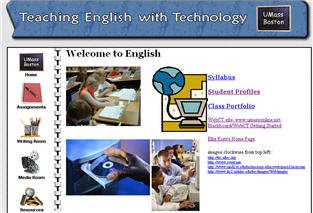As I type this, my spellcheck keeps finding blog and its derivatives as misspelled words. It feels great to be ahead of the spellcheck curve and continues to validate my belief that my students should be able to spell despite the existence of such tools. Anyway, Knobel and Lankshear make a decent point about the power dynamics of blogging, but it seems relatively obvious to me. Blogging, like any other form of media, will have an unequal distribution of popularity and I don’t think anyone should be surprised. I also don’t think it should taint the medium in any way. While the blogosphere itself may not be very democratic, its existence is. That is, bloggers who have been denied access in more traditional mediums have found an audience or ways of amplifying their voices. There might be gatekeepers when it comes to success or popularity, but at least they aren’t named Rupert Murdoch. In the classroom, any student can create and develop a blog. The same cannot be said for a book or newspaper. I guess one point I’m most intrigued with in this whole technology discussion is the access students have to creating media. A student with some time, tech savvy, and resources (whether through school or a middle-class family’s income) can make his/her own CD, DVD, podcast, online radio station, etc. It’s entirely possible and likely that no one will notice or care, but the restrictions on such enterprises used to be more material things like access to a studio or studio time. Now the limits on success have much more to do with finding an audience. Of course, even if a blog has no audience, a studio is not going to shut it down
In some ways I feel like I’m back at square one and Kajder’s mantra about the right tools for the right purpose keeps echoing. I think blogs are great; there are several I read regularly (and
Blogging seems well-suited to documenting a process of some sort. In the film class at my school each film crew was required to blog about their progress (http://whsfilmfestival.com/Walpole%20High%20School%20Film%20Festival/Blog%20Main%20Page.html) as they went along. It was a new idea this year and in my evaluation had only limited success. The idea is a strong one, and the potential is there for students to blog about their film influences, post short clips of their work writing, filming, and editing, write about and comment on problems, etc.
A more universally practical idea is using a blog as a companion to a long-term project like a research paper. Students could document process work, which would utilize the blog’s chronological format, try using the blog to test ideas, connections, and so on, and get feedback from other students in the comments section. Students could link to or review other resources for whatever their topic is as well. I think this idea is feasible and could pay real dividends in the students’ work. It could give students another reason to be invested in their project, force them to try out and write about some different ideas before they go into the paper, and allow them to see others’ process.
That’s the closest I can get to satisfying the two most intimidating conditions K&L have; purpose and well-defined point of view. The point of view is something I believe students could really start to develop through blogging. I’m not sure these blogs would hold much interest to people outside the school, but I’m also not convinced they need to.
That’s what I have so far. Happy blogging!
